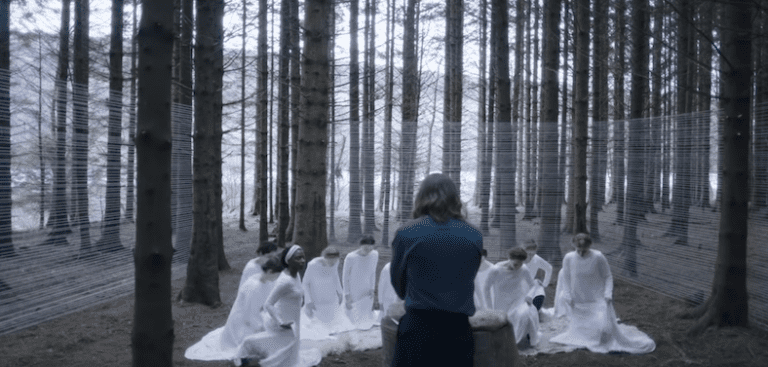
With most theaters closed, The Other Lamb—an art-house horror film—landed on various video-on-demand services this weekend. It makes for an interesting-if-difficult watch, especially in this strange season of ours.
The story takes us into a polygamous cult led by a man we know mostly as “the Shepherd.” He has surrounded himself with women and girls—his own wives and daughters. The Shepherd paints himself as a Messianic figure (played by Michiel Huisman, he even looks like Jesus), and almost everyone in his extended harem believes it. They even pray to him.
It sounds pretty messed up, and it is. It’s hard to believe, as we watch, that folks would fall for the Shepherd’s crazy line—that they’d give up so much of themselves with what appears to be very little in return.
But in the context of today, perhaps we can understand the attraction a tiny bit better.
For the first five minutes, at least, the cult looks almost bucolic. We see the movie’s young heroine, Selah (Raffey Cassidy) laughing by a beautiful waterfall with one of her friends. The girls and women sing softly together as they go about their daily business, seemingly at peace.
Theirs is a community that would be untouched by the coronavirus. Instead of forced isolation, their solitude has a purpose to it—to be unsullied and uninfected by a world that Shepherd insists is “broken.” They have a clear sense of calling: To serve Shepherd. They have food. Companionship. They belong here, with him … or so they’re told.
But while they might not be as worried about social distancing and toilet paper like the rest of us, their own community is seriously sick. The problems don’t end with polygamy, or that some of his wives seem children themselves, or the themes of incest that we see the first hints of quite early on. The biggest issue is power: Shepherd has it all. The women have none. They have just as much control over their lives as the lambs that are periodically sacrificed and slaughtered.
The film winds up going some pretty weird (and gross) places, and Director Malgorzata Szumowska clearly has a lot on her mind with its telling. Cults are inherently weird and fascinating, and some might see a broader critique of patriarchal society and religious power. And indeed, when it comes to the latter issue, the dynamics in play in The Other Lamb don’t feel all that different from those detailed by survivors from the Catholic sexual abuse scandal: If you believe that someone’s been vested with special authority from God, who are you to question what he says or does?
For me, The Other Lamb serves as an outsized example of the dangers of placing too much trust in people—even and perhaps especially people who claim to have The Answers or follow the same God as you do.
For a lot of the girls in the Shepherd’s cult, questioning that authority wasn’t an option, of course. They were literally born into it. It’s all they had ever known. Thankfully, most of us have far more recourse to information, including spiritual information. And yet, it seems like every few months, we hear of another religious leader who abused his position of authority—and hear about those who try to either hide or excuse the leader’s immoral and, often, illegal acts.
Charisma is indeed a potent form of power in most spiritual bodies. We follow leaders who have a way about them—who preach effectively and passionately, who talk about eternal mysteries and make them a little more understandable. Most of the world’s religions are centered on leaders who drew people to them: the Buddha, Mohammed, Jesus.
But here’s the thing: in my own religion, Christianity, the Bible makes a big deal that not only was Jesus the Son of God, but He was the fulfillment of Scripture and the embodiment of God-given truths—the Word made flesh, in John’s words. How did Jesus’ followers know He was the real deal? It wasn’t just because He said so (and indeed, for much of His ministry, Jesus took pains not to say so): It was because the Scriptures said so.
The Bible itself warns us to carefully weigh the claims of those who would lead us—to separate the spiritual trash from the good stuff. The writers constantly warned of false prophets and teachers and those who, in Jude’s words, “pervert the grace of our God into sensuality …”. “Beloved, do not believe every spirit, but test the spirits to see whether they are from God,” we read in 1 John 4:1, “for many false prophets have gone out into the world.”
The Other Lamb falls short, I think, both as a thoughtful art piece and as a horror flick. But it does offer a sober warning to those who would abuse their authority—one also echoed in the Bible. As Paul writes in 2 Corinthians 11:13-15:
“For such men are false prophets, deceitful workmen, disguising themselves as apostles of Christ. And no wonder, for even Satan disguises himself as an angel of light. So it is no surprise if his servants, also, disguise themselves as servants of righteousness. Their end will correspond to their deeds.”













